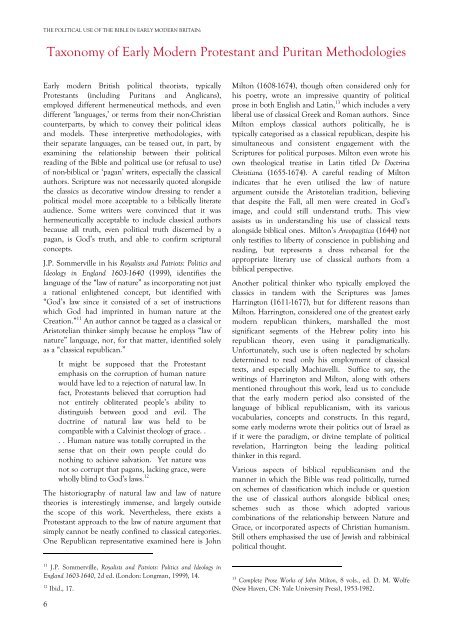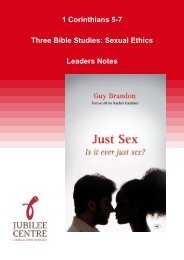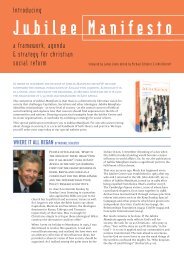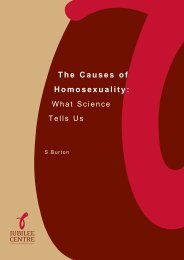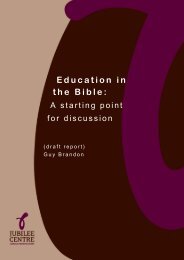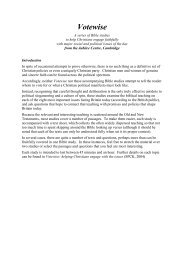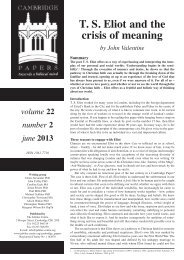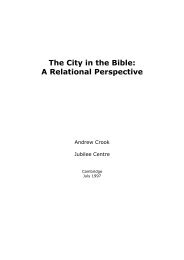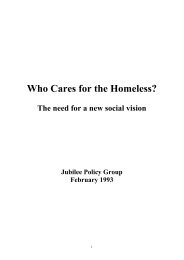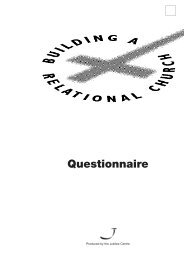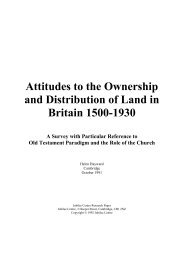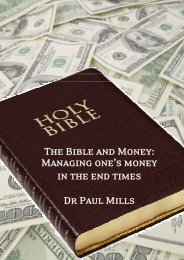Report Template - Jubilee Centre
Report Template - Jubilee Centre
Report Template - Jubilee Centre
Create successful ePaper yourself
Turn your PDF publications into a flip-book with our unique Google optimized e-Paper software.
THE POLITICAL USE OF THE BIBLE IN EARLY MODERN BRITAIN:<br />
Taxonomy of Early Modern Protestant and Puritan Methodologies<br />
Early modern British political theorists, typically<br />
Protestants (including Puritans and Anglicans),<br />
employed different hermeneutical methods, and even<br />
different ‘languages,’ or terms from their non-Christian<br />
counterparts, by which to convey their political ideas<br />
and models. These interpretive methodologies, with<br />
their separate languages, can be teased out, in part, by<br />
examining the relationship between their political<br />
reading of the Bible and political use (or refusal to use)<br />
of non-biblical or ‘pagan’ writers, especially the classical<br />
authors. Scripture was not necessarily quoted alongside<br />
the classics as decorative window dressing to render a<br />
political model more acceptable to a biblically literate<br />
audience. Some writers were convinced that it was<br />
hermeneutically acceptable to include classical authors<br />
because all truth, even political truth discerned by a<br />
pagan, is God’s truth, and able to confirm scriptural<br />
concepts.<br />
J.P. Sommerville in his Royalists and Patriots: Politics and<br />
Ideology in England 1603-1640 (1999), identifies the<br />
language of the “law of nature” as incorporating not just<br />
a rational enlightened concept, but identified with<br />
“God’s law since it consisted of a set of instructions<br />
which God had imprinted in human nature at the<br />
Creation.” 11 An author cannot be tagged as a classical or<br />
Aristotelian thinker simply because he employs “law of<br />
nature” language, nor, for that matter, identified solely<br />
as a “classical republican.”<br />
It might be supposed that the Protestant<br />
emphasis on the corruption of human nature<br />
would have led to a rejection of natural law. In<br />
fact, Protestants believed that corruption had<br />
not entirely obliterated people’s ability to<br />
distinguish between good and evil. The<br />
doctrine of natural law was held to be<br />
compatible with a Calvinist theology of grace. .<br />
. . Human nature was totally corrupted in the<br />
sense that on their own people could do<br />
nothing to achieve salvation. Yet nature was<br />
not so corrupt that pagans, lacking grace, were<br />
wholly blind to God’s laws. 12<br />
The historiography of natural law and law of nature<br />
theories is interestingly immense, and largely outside<br />
the scope of this work. Nevertheless, there exists a<br />
Protestant approach to the law of nature argument that<br />
simply cannot be neatly confined to classical categories.<br />
One Republican representative examined here is John<br />
Milton (1608-1674), though often considered only for<br />
his poetry, wrote an impressive quantity of political<br />
prose in both English and Latin, 13 which includes a very<br />
liberal use of classical Greek and Roman authors. Since<br />
Milton employs classical authors politically, he is<br />
typically categorised as a classical republican, despite his<br />
simultaneous and consistent engagement with the<br />
Scriptures for political purposes. Milton even wrote his<br />
own theological treatise in Latin titled De Doctrina<br />
Christiana (1655-1674). A careful reading of Milton<br />
indicates that he even utilised the law of nature<br />
argument outside the Aristotelian tradition, believing<br />
that despite the Fall, all men were created in God’s<br />
image, and could still understand truth. This view<br />
assists us in understanding his use of classical texts<br />
alongside biblical ones. Milton’s Areopagitica (1644) not<br />
only testifies to liberty of conscience in publishing and<br />
reading, but represents a dress rehearsal for the<br />
appropriate literary use of classical authors from a<br />
biblical perspective.<br />
Another political thinker who typically employed the<br />
classics in tandem with the Scriptures was James<br />
Harrington (1611-1677), but for different reasons than<br />
Milton. Harrington, considered one of the greatest early<br />
modern republican thinkers, marshalled the most<br />
significant segments of the Hebrew polity into his<br />
republican theory, even using it paradigmatically.<br />
Unfortunately, such use is often neglected by scholars<br />
determined to read only his employment of classical<br />
texts, and especially Machiavelli. Suffice to say, the<br />
writings of Harrington and Milton, along with others<br />
mentioned throughout this work, lead us to conclude<br />
that the early modern period also consisted of the<br />
language of biblical republicanism, with its various<br />
vocabularies, concepts and constructs. In this regard,<br />
some early moderns wrote their politics out of Israel as<br />
if it were the paradigm, or divine template of political<br />
revelation, Harrington being the leading political<br />
thinker in this regard.<br />
Various aspects of biblical republicanism and the<br />
manner in which the Bible was read politically, turned<br />
on schemes of classification which include or question<br />
the use of classical authors alongside biblical ones;<br />
schemes such as those which adopted various<br />
combinations of the relationship between Nature and<br />
Grace, or incorporated aspects of Christian humanism.<br />
Still others emphasised the use of Jewish and rabbinical<br />
political thought.<br />
11<br />
J.P. Sommerville, Royalists and Patriots: Politics and Ideology in<br />
England 1603-1640, 2d ed. (London: Longman, 1999), 14.<br />
12<br />
Ibid., 17.<br />
13<br />
Complete Prose Works of John Milton, 8 vols., ed. D. M. Wolfe<br />
(New Haven, CN: Yale University Press), 1953-1982.<br />
6


